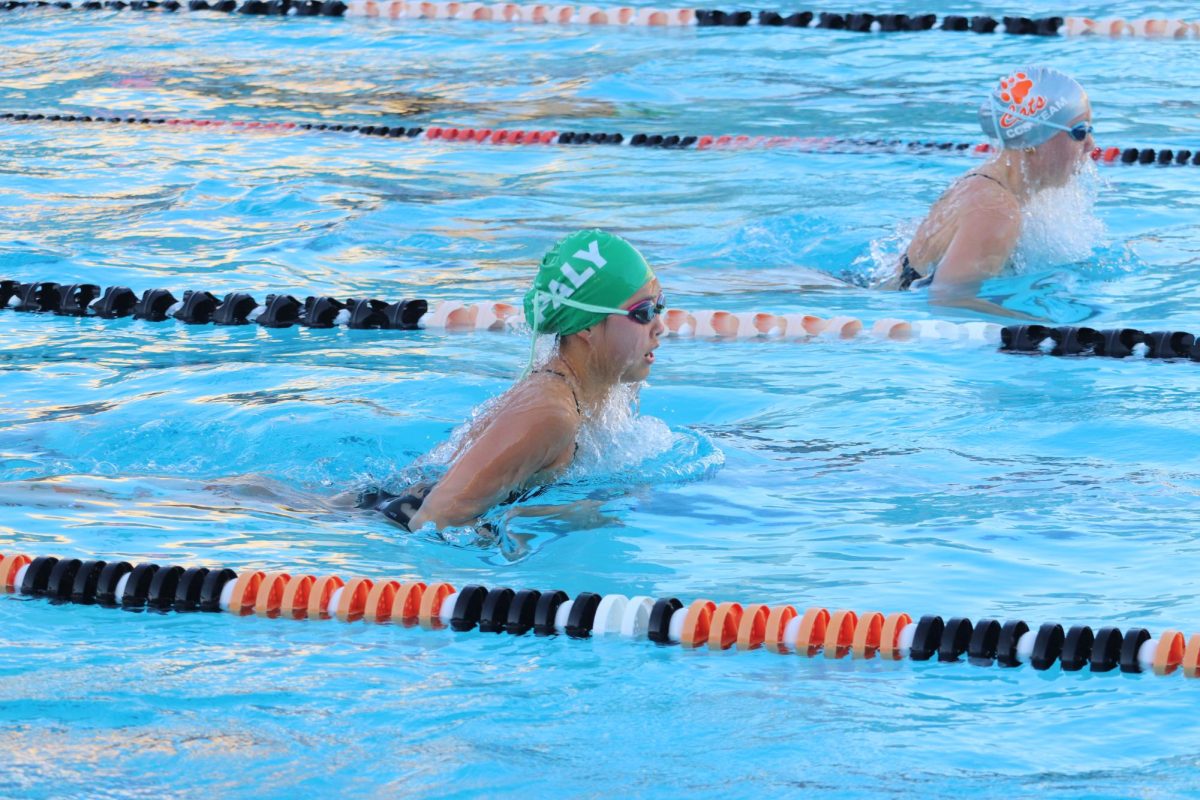Full Court Stress
As finals approach, students struggle to find ways to cope with stress. However, exercise has proven to be one of the best stress release activities.
February 18, 2016
Wake up. Go to school. Study. Sleep. Repeat. As the end of the semester approaches, this seems to be the daily life of many high school students. The overload of school work and stress without the proper rest needed for a healthy lifestyle leads students to become consumed by anxiety and stress.
As students prepare for finals, they’ll search for a stress relief outlet to help themselves relax. Some students turn to social media, binge eating or even crying to cope with stress throughout the school year, and this heightens during finals. However, few resort to physical activity and exercise in order to alleviate stress. Exercise has numerous benefits that reduce the anxiety that comes from high-pressure, and can be very valuable in high-stress situations.
Physical activity causes the release of chemicals in the brain, called endorphins. According to WebMD, endorphins “trigger a positive feeling in the body, similar to that of morphine… [and] can be accompanied by a positive and energizing outlook on life.”
In addition to the pleasure endorphins provide, they also improve the body’s ability to sleep, which boosts one’s physical and mental health. According to Harvard’s Division of Sleep Medicine, experiencing deeper and longer sleep cycles can lead to an improved metabolism, memory, and learning capability.
“I find that when I don’t exercise, I’m very anxious because I have a lot of pent up energy,” basketball player Maya Lathi (‘17) said. “Exercising helps release that anxiety.”
Taking a break from studying to move the body can improve one’s physical and emotional state. According to the Anxiety and Depression Association of America (ADAA), exercise is one of the most recommended stress-coping methods by healthcare professionals. ADAA also says that stress has been shown to deplete one’s energy and ability to concentrate. However, exercise can counteract these negative effects of stress and is shown to reduce fatigue, and improve alertness and concentration.
“I think a lot of times getting your mind off the subject can allow you to relax,” varsity girl’s basketball coach Scott Peters said. “When you come back to your problem after practice, you look at it with a fresh new start. You also get a new, different perspective.”
When the brain is forced to focus on one specific thing for a long duration of time, a proper break is needed to refresh. However, the route many teens take to alleviate stress is to unwind by using social media. Unfortunately for these students, switching from studying to social media is not the correct way to revitalize the brain. According to Victoria L. Dunckley, M.D., overusing screen-time can cause sensory overload or hyper-arouse one’s nervous system. Both of these conditions can lead to lack of sleep, moodiness and/or lack of focus.
In contrast to the harsh consequences electronics place on the mental state of a student, physical activity improves concentration and reduces fatigue. By getting a change of scenery and increasing one’s heart rate, the brain receives a mental break. When a person exercises, they release their stress and forget the built up tension caused by the stress. This results in being more attentive and optimistic about one’s upcoming event, or in the case of students, tests and finals.
By using technology as a study break, high schoolers continue to put excessive stress on their brains, possibly harming their mental and physical state. According to the Mayo Clinic, the best way to spend a study break is exercising. The proven research of exercise shows that exercise can help one refocus and unwind.
“As you begin to regularly shed your daily tensions through movement and physical activity, you may find that this focus on a single task, and the resulting energy and optimism, can help you remain calm and clear in everything you do.” Mayo Clinic says.
So next time you are stuck on a tough math problem you just can’t seem to figure out, even taking a walk can help you to refocus, clear your mind, and alleviate some stress for the time being.
As great as it is for students and people in general to exercise during a stressful time, it is equally important to exercise regularly.
“Exercise can increase self confidence, it can relax you, and it can lower the symptoms associated with mild depression and anxiety. Exercise can also improve one’s sleep, which is often disrupted by stress, depression and anxiety” says the Mayo Clinic.
Researchers from the ADAA have found similar outcomes.
“Scientists have found that regular participation in aerobic exercise has been shown to decrease overall levels of tension, elevate and stabilize mood, improve sleep, and improve self-esteem,” ADAA said. “Even five minutes of aerobic exercise can stimulate anti-anxiety effects.”
With all the benefits exercise offers, it almost seems that there’s no reason not to go to the gym or go for a run around the neighborhood. However for some, motivation may not be the problem. Some people simply don’t know what exercise is going to help them, or don’t believe they have the resources to create a successful workout.
Luckily, this shouldn’t be a concern. The Stress Management Society (SMS) says that any kind of exercise will benefit the body and the mind.
“Any form of physical activity leads to the release of these feel good neurotransmitters,” SMS said.
Did you hear that? Any kind of desired exercise will help your mind and your body! Though for many who still know this fact, it’s hard to decide what kind of exercise is best for them. The Association of Stress Management (ASM) suggests choosing an exercise that you know you’ll enjoy.
In other words, if you don’t like running, don’t run. Instead go for a walk or maybe do some push-ups. Any kind of exercise you choose is going to improve how you feel. The ASM also recommends to start slow. If exercise is a new thing for you, just take your time and ease your way into it.
“Don’t go throwing yourself into the deep end as this will result in a higher risk of injury and you will feel less motivated as you won’t be enjoying the exercising that you are partaking in.” ASM said.
When starting out, maybe begin with shorter easier workouts, and build your way into intense running or any kind of other physical activity that is appealing to you. The ultimate thing to understand is that exercise, no matter what kind, will always benefit your health and is especially important to take part in when you are stressed.






